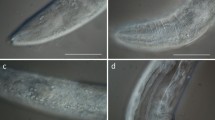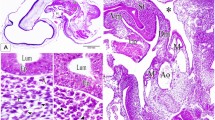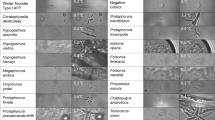Abstract
THE presence of proteins tanned by an orthoquinone has been established in certain arthropodan cuticles1–3 and in trematode egg capsules4. Recently, Dennell5 has shown that the chætæ of the earthworm Allolobophora are hardened by quinone-tanning. He also suggested that quinone-tanning of protein structures may be a widespread occurrence in the invertebrates. Observations which have been recently made on the bivalve ligament indicate the presence of a similar phenomenon.
This is a preview of subscription content, access via your institution
Access options
Subscribe to this journal
Receive 51 print issues and online access
$199.00 per year
only $3.90 per issue
Buy this article
- Purchase on Springer Link
- Instant access to full article PDF
Prices may be subject to local taxes which are calculated during checkout
Similar content being viewed by others
References
Pryor, M. G. M., Proc. Roy. Soc., B, 128, 393 (1940).
Dennell, R., Proc. Roy. Soc., B, 134, 79 (1947).
Dennell, R., Proc. Roy. Soc., B, 134 485 (1947).
Stephenson, W., Parasit., 38, 128 (1947).
Dennell, R., Nature, 164, 370 (1949).
Trueman, E. R., Proc. Zool. Soc. Lond., 119, 719 (1949).
Author information
Authors and Affiliations
Rights and permissions
About this article
Cite this article
TRUEMAN, E. Quinone-tanning in the Mollusca. Nature 165, 397–398 (1950). https://doi.org/10.1038/165397c0
Issue Date:
DOI: https://doi.org/10.1038/165397c0
This article is cited by
-
Identification of Ligament Intra-Crystalline Peptide (LICP) from the Hinge Ligament of the Bivalve, Pinctada Fucata
Marine Biotechnology (2015)
-
Sclerotization of the periostracum of the marine bivalvePerna viridis (Linnaeus)
Proceedings: Animal Sciences (1989)
-
The fine structure and crystallography of the hinge ligament ofSpisula solidissima (Mollusca: Bivalvia: Mactridae)
Journal of comparative physiology (1976)
Comments
By submitting a comment you agree to abide by our Terms and Community Guidelines. If you find something abusive or that does not comply with our terms or guidelines please flag it as inappropriate.



